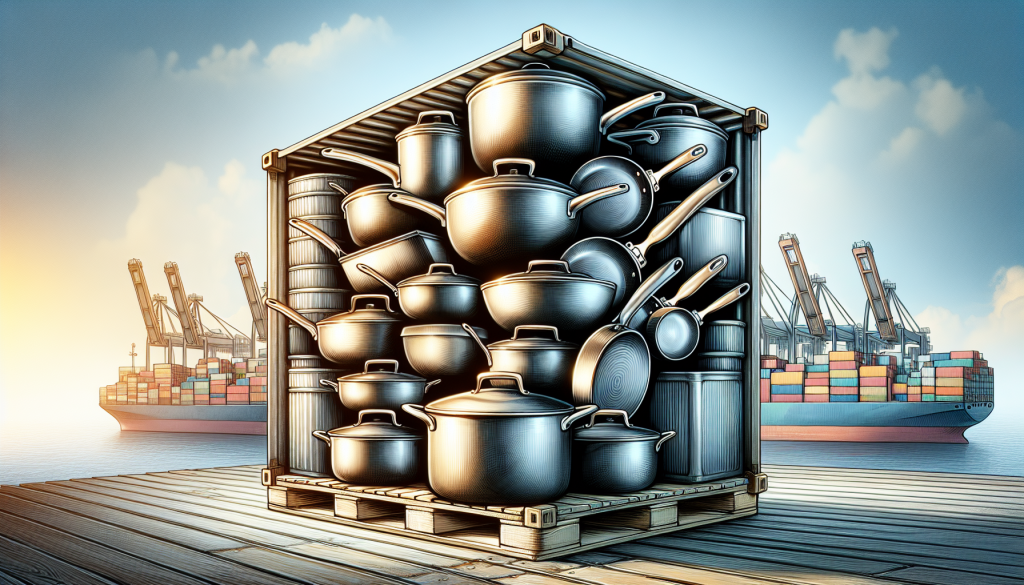Unlock Hassle-Free Cooking: Why ISF For Pans Matters
What happens when you decide to import pans for your kitchen? Is it just about choosing the right supplier and waiting for your shipment to arrive? There’s much more to it, especially when it comes to filing your Importer Security Filing (ISF). You may find yourself wondering, “Why should I file ISF for pans?” Let’s peel back the layers of this essential process.

Understanding Importer Security Filing (ISF)
Before you can appreciate the nuances of why you should file ISF for pans, it’s crucial to understand what ISF actually is. Essentially, the ISF is a set of data submitted to U.S. Customs and Border Protection (CBP) before your cargo is shipped to America. Think of it as the first line of defense in ensuring safe and lawful trade.
Why does this matter particularly for pans? Because any kitchen equipment, including pans, that crosses borders must comply with import regulations. The ISF provides the CBP with information about your shipment, reducing the risk of delays, penalties, and even seizures upon arrival.
The Benefits of Filing ISF for Pans
So, why should you file ISF for pans specifically? Here are some compelling reasons:
Avoiding Penalties
Failing to file your ISF on time can result in hefty fines that can sting your bottom line. By making sure you comply ahead of time, you protect your investment.Ensuring Smooth Customs Clearance
If your ISF isn’t filed, your shipment might face delays at customs. These delays can lead to increased shipping costs and dissatisfaction among your customers waiting for their new cookware.Boosting Security
Filing ISF isn’t just about paperwork; it’s about ensuring that the items imported into the country are safe and secure. This is vital when you think about the potential risks of importing goods.Streamlined Process
Once you have your ISF in order, tracking your shipment becomes easier. This is particularly useful if your pans are urgently needed for a busy season in your business.Improved Planning
Knowing all the details of your shipment beforehand allows you to make better business decisions. This can culminate in timely product launches or inventory management.
Key Information Required in ISF for Pans
When you’re preparing to file your ISF, certain key details must be included. Missing any of these data points could put your shipment at risk. Here’s what you typically need:
| Required Information | Description |
|---|---|
| Importer of Record (IOR) | Your business name and address |
| Consignee | Person or entity to whom the goods are shipped |
| Manufacturer Details | Name and address of the pan manufacturer |
| Country of Origin | The country where the pans are made |
| Cargo Description | Clear description of goods (e.g., stainless steel pans) |
| Quantity | Number of pans being imported |
| Estimated Arrival Date | When do you expect your shipment to arrive? |
| Bill of Lading Number | Unique identifier for your shipment |
Filing ISF for pans demands attention to detail. Ensure you double-check everything to make your process as smooth as possible.
Call to Action: Importer Security Filing
Now that you see the importance behind why you should file ISF for pans, it’s time to take action. If you find all this information overwhelming, don’t fret! Our Importer Security Filing service is designed to simplify this process for you. By entrusting the compliance details to experts, you can focus on what you do best: running your business.
The Consequences of Not Filing ISF
What happens if you decide to forgo the ISF altogether? The consequences can be dire:
Additional Surveillance by Customs
If your ISF isn’t filed, you can expect more scrutiny. Customs may flag your shipment for more intense inspections, leading to delays.Higher Costs
The financial implications can add up quickly. Fines, shipping delays, and even potential storage costs while awaiting customs clearance can significantly cut into your profits.Potential Seizure of Goods
In the most severe cases, your pans could be seized if proper documentation isn’t filed. This could lead to loss of inventory and customer trust.Loss of Reputation
Delays impact your overall service delivery. If customers don’t receive their orders on time, it can tarnish your brand image and reduce future sales.Legal Ramifications
Not complying with U.S. import regulations can expose your business to legal issues, which can take time, resources, and money to rectify.
Call to Action: Entry Filing
You’ve seen how crucial the ISF is for your pans—you can’t afford to ignore it. Are you ready to ensure a hassle-free experience? Our Entry Filing service can help you prepare accurate customs documentation, expediting your imports while keeping you compliant with regulations.

Delving Deeper: Filing Requirements
Filing an ISF may seem like a quick task, but it involves a series of requirements to be done correctly. Here’s a closer look:
The Correct Time to File
The ISF must be filed at least 24 hours before the cargo is loaded onto a vessel bound for the U.S. This early notice allows customs to process the information efficiently, reducing the possibility of delays.
Who Should File ISF?
Ideally, the importer of record—typically the person or business in control of the products—should file the ISF. Sometimes, a licensed customs broker can file on your behalf. However, regardless of who files, the ultimate responsibility lies with the importer.
Know the Different Filing Types
Understanding that there are a few different ISF filing types is helpful:
- Master ISF: This is filed for shipments traveling together on a single carrier.
- Consolidated ISF: If you’re receiving multiple shipments consolidated into one, this is the preferred filing type.
- Individual ISF: Directly corresponds to one specific shipment.
Double Check Your Details
Attention to detail is key when filing ISF. Information listed must be precise because even small errors can lead to significant consequences. Here are ways to ensure your submission is error-free:
- Cross-reference Supplier Data: Make sure manufacturer and supplier addresses match up.
- Use Accurate Measurements: Quantity and weight must be accurate. Rounding numbers could create discrepancies.
- Double-check Dates: Any dates mentioned, particularly the estimated arrival date, should be carefully calculated.
Call to Action: Import Bond
Did you know that having an import bond is another crucial aspect of the import process? Since you’ve learned about the importance of filing ISF for pans, now consider securing an Import Bond. This bond ensures that you comply with all customs regulations, protecting you against any financial obligations arising from potential violations.
The Role of Customs Brokers
Navigating the complexities of ISF filing can be overwhelming. This is where customs brokers come into play. They offer specialized knowledge and can assist you through the process, ensuring that everything from the ISF to entry filing is handled efficiently.
What is a Customs Broker?
A customs broker is a professional licensed by CBP to act on behalf of importers/exporters. They navigate the needs of your shipment, dealing with customs regulations and paperwork so you can focus on your core business operations.
Benefits of Using a Customs Broker
You may ask, “Why should I invest in hiring a customs broker?” Here are some reasons:
Expert Knowledge
Customs brokers understand the ins and outs of import regulations, ensuring compliance with CBP rules.Time Saver
They can take the load off your shoulders by managing all the paperwork and communications needed for the compliance process.Fewer Errors
Experienced brokers know how to spot potential discrepancies, reducing the likelihood of costly mistakes in your filings.Streamlined Communication
A customs broker acts as a middleman, making communication with different stakeholders more manageable, whether it’s suppliers, shipping companies, or customs agents.Risk Management
With their expertise, customs brokers can help you identify potential risks ahead of time, ensuring your shipment passes through customs seamlessly.
Final Thoughts on Why Should I File ISF for Pans
Importing pans for your kitchen or business isn’t just about connecting with a supplier and waiting for a shipment. You need to consider several factors, primary among them is ensuring that you file your ISF efficiently.
Filing ISF for pans provides peace of mind—knowing that you won’t face unnecessary delays or penalties. It emphasizes your commitment not only to regulatory compliance but also to providing excellent service to your customers who rely on you for quality and timely delivery.
Speak with an Import Expert for Free
Don’t let the complexities of importing hold you back from expanding your kitchenware offerings. Speak with an Import Expert for Free today! By seeking expert advice, you can navigate the filing processes effectively. Your pathway to importing pans seamlessly is right at your fingertips.
